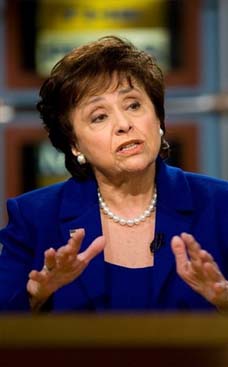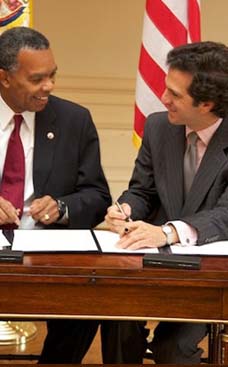
My dad is the reason I'm a filmmaker. He's a remarkably good storyteller and I had the great gift of spending my childhood listening to his stories at the dinner table. But film was just a dream for me for the longest time; I had no idea how to start. I got my bachelor's degree in film and though I did lots of small projects and never felt that I'd actually made a real film. It wasn't until I joined the Peace Corps after college that I decided I had to go for it. As a Peace Corps volunteer, I lived in an economically depressed Lithuanian town working as a high school teacher. As I got to know people and the difficulties they faced, I started to recognize the unbelievable amount of opportunity available to me in the States. After two amazing years in Lithuania, I came home and started to work at becoming a real filmmaker. My experience in abroad also gave me a lot of new insights and I had things I wanted to say; film became my medium for that expression. As an American I felt I had to be very conscious about how I created images of Malawians. I wanted the people to seem whole, normal and intelligent because that's how I saw them. To depict that, I shot them as everyday people and tried not to show them in an overly exotic way. I did shoot beauty shots of people, some of which I used in the final film because I felt comfortable that they didn't dominate the film.
Lithuania RPCV Cy Kukenbaker directs "Bush League" about soccer in Malawi
Vancouver International Film Festival 2010 Interview – "Bush League" director Cy Kukenbaker
Bush League - At VIFF 2010
by Jason Whyte
"At its depths, Bush League is really just about people and their struggles in life. Africans are often depicted in exotic contexts so I wanted to do the opposite in a way, I wanted to get into the details of daily life. What I found there absolutely amazed me." Director Cy Kukenbaker on the film "Bush League" which screens at this year's Vancouver International Film Festival.
Is this your first film in the VIFF? Do you have any other festival experience? Do you plan to attend Vancouver for the screenings?
This will be my first time to VIFF and it will be the world premiere of "Bush League". I think it's a great forum to launch the film and also just one of those places I've always wanted to go. I have festival experience with my short films but because this my first feature film this is a really special event for me.
Could you give me a little look into your background and what led you to the desire to want to make film?
My dad is the reason I'm a filmmaker. He's a remarkably good storyteller and I had the great gift of spending my childhood listening to his stories at the dinner table. But film was just a dream for me for the longest time; I had no idea how to start. I got my bachelor's degree in film and though I did lots of small projects and never felt that I'd actually made a real film. It wasn't until I joined the Peace Corps after college that I decided I had to go for it. As a Peace Corps volunteer, I lived in an economically depressed Lithuanian town working as a high school teacher. As I got to know people and the difficulties they faced, I started to recognize the unbelievable amount of opportunity available to me in the States. After two amazing years in Lithuania, I came home and started to work at becoming a real filmmaker. My experience in abroad also gave me a lot of new insights and I had things I wanted to say; film became my medium for that expression.
Growing up, you were no doubt asked the eternal question "When I grow up I want to be a …" Finish this sentence, please!
A fighter pilot. I loved airplanes when I was a kid.
How did this project come to fruition? If you could, please provide me with a rundown, start to finish, from your involvement.
I guess the main resource needed for filmmaking is money but since I never have any, I think about things a little differently. In 2006 I was just finishing grad school and knew I had to shoot a film as soon as possible to keep all my skills sharp. I had a good friend living in Malawi who I'd visited once before. I had the equipment, which I had bought piece meal during grad school. I also had time and more than anything I was dying to go back to Malawi. The thing I didn't have was enough money to get there, but I got a really lucky break. A film fest in Europe flew me over to show a short film I'd made and I was able to afford a ticket from there to Malawi.
When I left the States I had one camera, a couple microphones, some clothes and about five hundred dollars cash. And the transmission in my car blew the day before I left, so I was really running on luck. Once I got to the village though I knew within a week that I'd find the film. Zolokere is a fascinating place and I'd been there once before so I knew some of the who's who.
Shooting the film was lots of hard work, but also incredible fun. I shot for three months then flew home where I had to face the music - I didn't have a job or any money left, my car was dead and I had seventy two thousand dollars in student debt looming over me. I got a job offer to work in Baghdad for the U.S. State Department and I took it. I worked at a transit facility at the airport there for almost two years to pay off my debts and finance the rest of the film. We worked 80-hour weeks but still managed to get a few hours of editing in each night. It became a kind of therapy for me.
In Baghdad, it really felt like I was living in the middle of a giant crime scene, so much of what was happening there was just heart-breaking. Returning the village through the film was an important escape from my daily reality. In Sept 08 I took a two week break from my job there and flew back to Malawi to shoot the film's ending. I finished working in Iraq a few months later and worked on the film for another year upon returning to the States. This film has truly been a labor of love.
What was the biggest challenge in the production of the movie, be it principal photography or post-production? What was your favourite moment of the process?
Post-production was very difficult. I had four main characters all with their own story lines and all of them used two different languages. It took two years to get the material translated and a total of six different translators to do it. Getting that right was very important to me - it had to be accurate. I was also editing at a military airport in Iraq, so the noise and occasional explosions never helped.
Otherwise, the film was really a joy to make. During the first production phase I lived in and shot in the village for three months and became part of the soccer team. I had the time of my life shooting the games and getting involved with all the drama on and off the field. We'd ride home in the truck, sometimes twenty people in one little Toyota, and it would rain like crazy and we'd all sing songs. The party would roll along through this valley of amazing landscapes and color singing and laughing – it was a phenomenal experience both personally and professionally.
Tell me about the technical side of the film; your relation to the film's cinematographer, what the film was shot on and why it was decided to be photographed this way.
I shot with a Panasonic DVX 100, which is a very popular camera for documentary because it has a great lens and shoots 24p. I did all the tech work myself and of all the tasks in filmmaking, I enjoy shooting the most. There are no sources of electricity anywhere near the village so powering the camera was a major issue. At first we drove three hours to town once per week and charged them there, but later I realized the truck's cigarette lighter was powered so I'd plug batteries in anytime it was running.
Artistically the challenges were much larger. As an American I felt I had to be very conscious about how I created images of Malawians. I wanted the people to seem whole, normal and intelligent because that's how I saw them. To depict that, I shot them as everyday people and tried not to show them in an overly exotic way. I did shoot beauty shots of people, some of which I used in the final film because I felt comfortable that they didn't dominate the film.
Who would you say your biggest inspirations are in the film world? Did you have inspirations from filmmakers for this film in particular?
There are too many to name but among the famous filmmakers I really admire are Agnes Varda, Monte Hellman, Lars Von Trier and Krzysztof Kieslowski. I also have a lot of friends who are not famous filmmakers (yet) but who have a tremendous positive influence on my work.
That said, what influenced me the most in the making of Bush League was a book - the Tropic of Cancer. I was reading it during production and I very consciously tried to emulate the freedom and release of Miller's writing in the way I shot the film.
If you weren't in this profession, what other career do you think you would be interested in?
I have this weird idea about making olive oil. There's so much computing involved in filmmaking that I dream about doing jobs that don't need computers. For some reason it occurred to me recently that someone has to make olive oil, which I love to cook with, so why not me?
I also have the fantasy of becoming an accountant. What I do is so impractical but everyone needs an accountant eventually.
Please tell me some filmmakers or talent that you would love to work with, even if money was no object.
If I could work with any two actors I would pick Emily Watson and Daniel Day-Lewis.
How important do you think the critical/media response is to film these days, be it a large production, independent film or festival title?
It's very important for my work. I would guess most critics care much more about film than I do. I care about stories much more than I do about film. I get frustrated with film because it has limits, I rail against it, and I get sick of it then love it again. It's a rocky marriage. But critics are often taking a much wider view, feeling the history and the different voices, so there's a lot to be said for that point of view and its value to anyone involved in this pursuit.
What would you say to someone on the street to see your film instead of the latest blockbuster playing at the local megaplex?
I go to the megaplex all the time myself, so I guess I'd say come watch my movie which will make you seem sophisticated to the opposite sex when you talk about it, then let's go with the opposite sex together to the megaplex.
No doubt there are a lot of aspiring filmmakers at film festivals who are out there curious about making a film of their own. Do you have any advice that you could provide for those looking to get a start, and especially for those with films in the festival circuit?
Don't bother unless you're obsessed and if you become obsessed don't forget what you're really most truly interested in and stick to that like a magnet.
And finally…what is your all time favourite motion picture, and why?
"The Godfather: Part II" is probably my number one.
This is one of the official selections in this year's Vancouver International Film Festival lineup. For more information on films screening at this year's fest, showtimes, updates and other general info, point your browser to www.viff.org.













